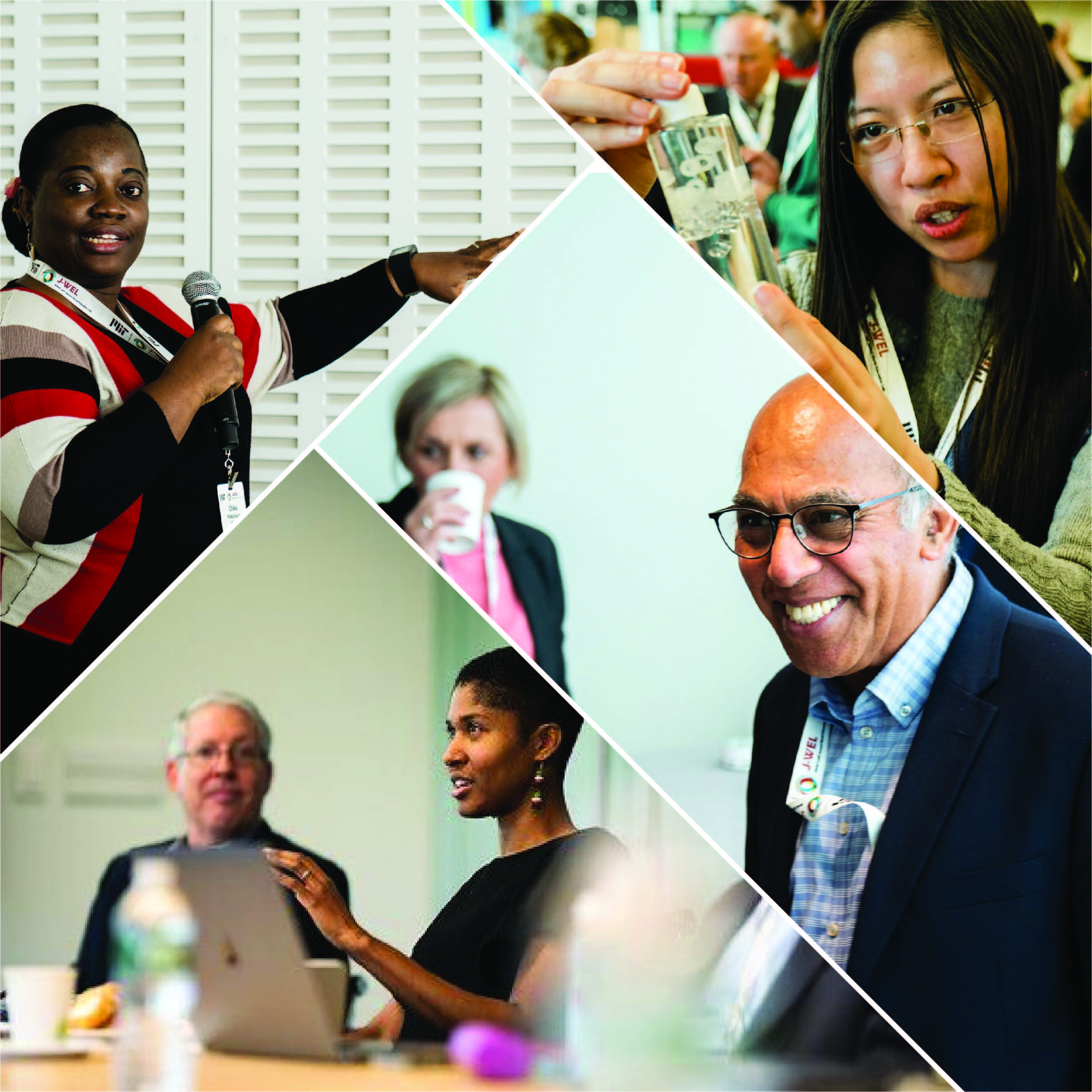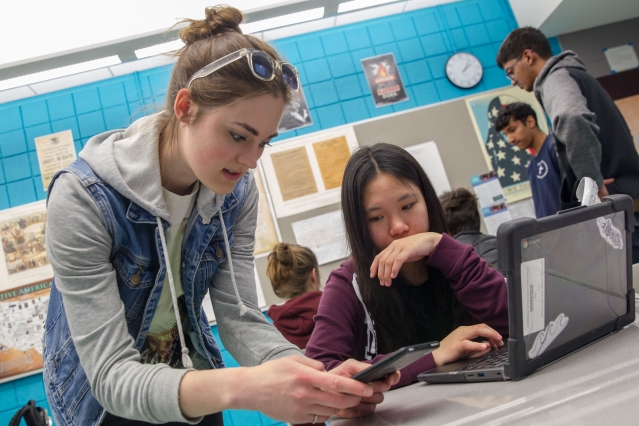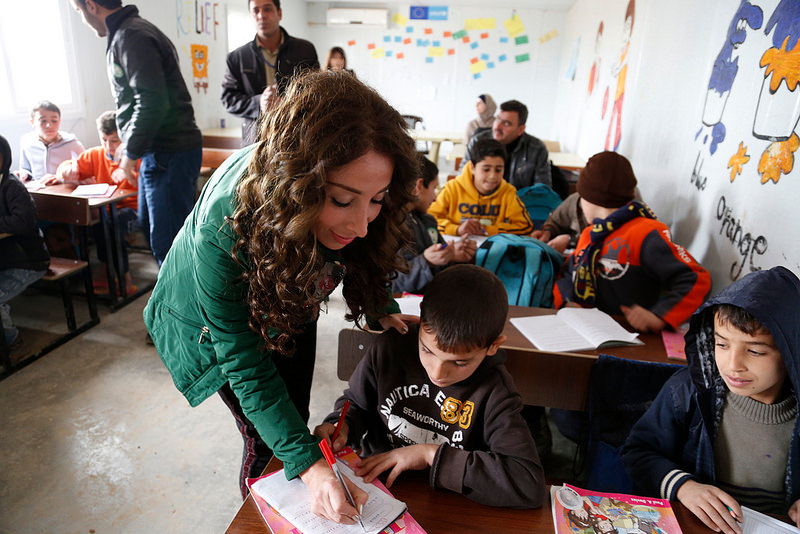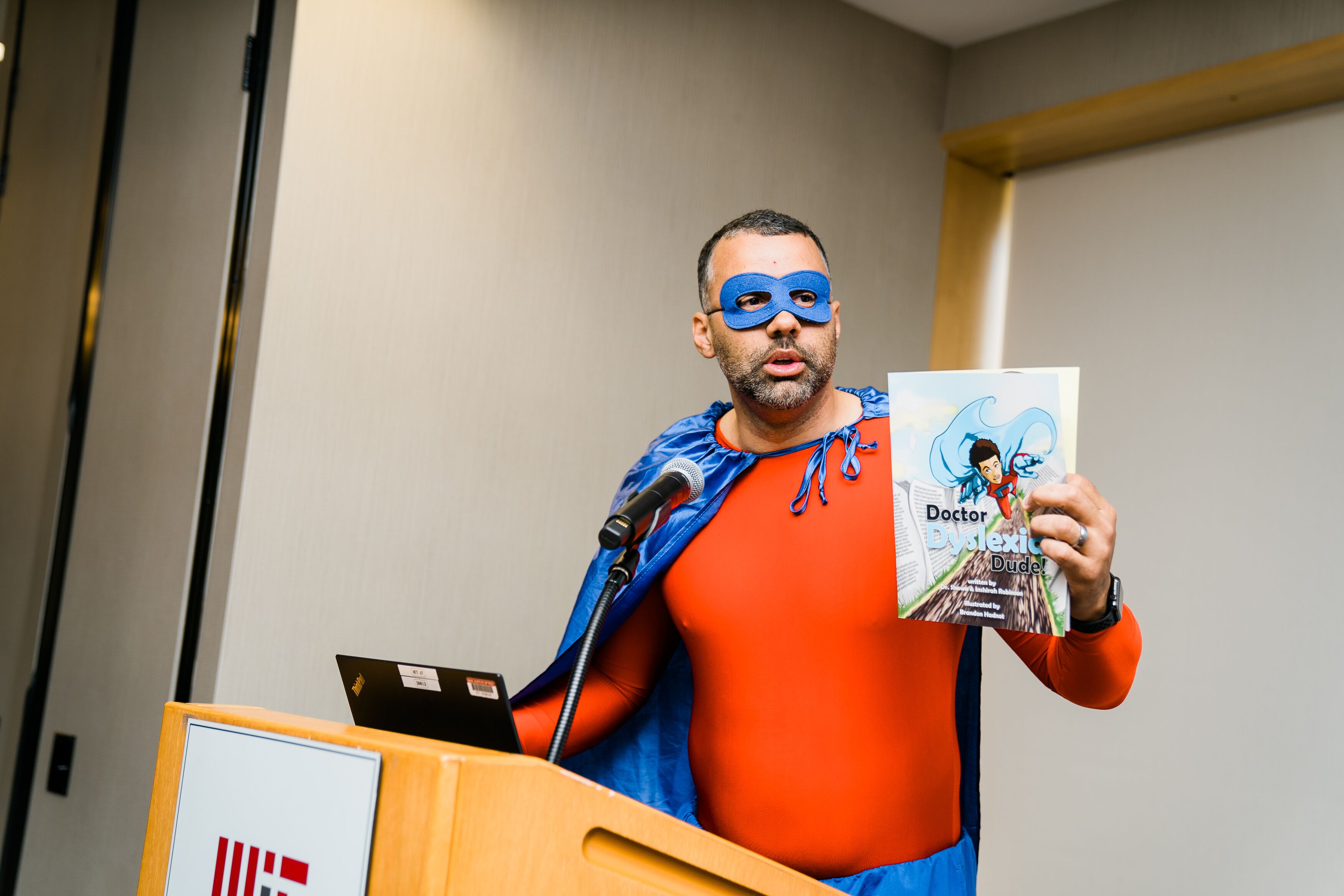Open Learning leads MIT’s commitment to reimagine education in a changing world and equip learners and educators with the skills and knowledge to create a better future. As we reflect on this year, we are excited and humbled to share our vision for how we believe Open Learning’s work is empowering learners around the world. We are creating new learning opportunities and uncovering new horizons in teaching with emerging technologies and research. We're also designing resources and models that can be localized and applied to different educational environments worldwide.
We especially thank our donors for sharing and supporting our commitment to reinvent education for learners here at MIT and around the world.

Educational technology is a powerful tool in creating life-changing teaching and learning experiences. Building on MIT’s leadership as a research institution, research plays an important role in informing how we design and apply educational technologies and resources to best support learning and increase learning effectiveness. We are just beginning to uncover the capabilities of virtuality technologies like virtual and augmented reality, developing adaptive physical tools through computation visualization, and using electroencephalography to understand the educational, social, and cognitive impacts of different interventions in and outside the classroom. We are also developing emerging technologies and non-digital tools to better understand, design, and adopt innovative approaches to assessments and learning effectiveness that will prepare individuals to participate in 21st century economies and societies.
Building upon the strengths and opportunities unlocked by open education, MIT Open Learning continues to expand and construct new educational pathways for seasoned and young learners alike. From open educational resources and online courses with the option for certification, to immersive experiences that blend online and in-person learning, we are diligently making our learning offerings as accessible as possible to bridge learners wherever they are with the opportunity to learn through MIT. With an eye to how these new online and flexible learning pathways are shifting the future of education and credentialing, MIT this year joined 8 other institutions to create a shared global infrastructure for digital academic credentials. Such an infrastructure will allow learners to maintain a compelling and verifiable digital record of their own lifelong learning achievements, and reinvent the tradition of academic transcripts to include new forms of educational certificates and credentials.


Tackling the world’s greatest challenges requires a collaborative effort. The Abdul Latif Jameel World Education Lab (J-WEL) engages educators, technologists, policymakers, societal leaders, employers, and employees through online and in-person collaborations, workshops, research, and information-sharing events that leverage MIT’s educational innovations, research, and practice. A membership- based organization, J-WEL members work with MIT faculty and staff to address global opportunities for scalable, high-impact change in education through collaboratives at the pK-12, higher education, and workforce learning levels. Now in its third year, J-WEL is already contributing to Open Learning’s mission to transform teaching and learning around the world.
JUNE 2019
-
The MIT-Harvard Healthcare Innovation Bootcamp returns for a second run.
-
Science of Reading event convenes researchers and educators to discuss how to use research to improve literacy outcomes.
-
Dean for Digital Learning, Krishna Rajagopal, presents at Explore MIT Today.
-
Graduate student in the Integrated Design and Management program shares how open learning led him to MIT.
-
More than 2 million people subscribe to OpenCourseWare's YouTube channel that offers more than 5,800 videos.
-
J-WEL hosts a two-week summer STEM program for junior high school students in Greece.
-
J-WEL Higher Education holds a Curriculum and Course Design Workshop.
-
J-WEL hosts the 8th annual LINC Conference which brings international researchers and practitioners together to discuss how learning science, pedagogical approaches, and digital learning can provide quality pK-12, higher education, and workforce learning at scale, particularly in developing nations.
-
Teaching with Digital Technology Award winners announced.
-
Deep Technology Bootcamp is hosted at MIT.
-
MIT Education Arcade welcomes XQ Summer Colloquium participants.
-
Q&A: David Hardt on teaching the principles of manufacturing MicroMasters program.
-
New York Times article on Short-Term Programs for Long-Term Success.
-
Horizon, a business-to-business subscription online library of cutting-edge micro-assets that helps large organizations understand and apply the latest developments in technology and science, launches.
-
MIT xPRO pilots new online course on Discovering and Implementing Your Leadership Strengths.
-
MITx launched 120 online courses with enrollments of nearly 1 million learners from more than 200 countries.
-
Enrollment in the MITx MicroMasters programs exceeded 250,000, with over 14,000 individual course certificates. 642 learners earned MicroMasters credentials, and 36 graduated from the Blended Master’s in Supply Chain Management. New credit pathways were established with 13 universities in 13 countries.
A road paved with open learning
After graduating from college in India, Samip Jain spent three years of evenings learning online, taking courses on web development, data analysis, music theory — anything that sated his appetite to learn ... all while working full-time as a software developer for a health care startup.
“Every night, I would learn something new,” he says. “I never want to stop learning and thinking beyond my limits.” Read the complete article.
MAY 2019
-
The Connected Learning Initiative (CLIx) completed its 4-year project, designing and developing curriculum for 478 schools with 2,500 teachers and 60,000 students.
-
Prof. Jonathan Gruber shares insights on how he teaches microeconomics in his MITx course and on campus.
-
Membership in J-WEL inspires the launch of CoLAB Data Science, a program to build data science capacity in Latin America.
-
Prof. Gil Strang’s class 18.06 (Linear Algebra) surpasses 10 million views on OCW.
-
xTalks hosts Ian (Ted) Young, MIT alum, former professor of electrical engineering, and now professor at Delft University of Technology in the Netherlands, spoke on iSSP, his newly published interactive textbook.
-
J-WEL member, Njala University in Sierra Leone, aims to prepare graduates for emerging job opportunities in STEM.
-
MIT xPRO pilots new online course on Leading Change in Organizations.
-
The pK-12 Action Group puts finishing touches on curriculum and modules for a summer STEAM camp, themed “Air,” in Hong Kong.
-
Virtual reality game, "Passage Home VR," simulates experiences with race.
-
Washington Post article on "When students learn by making projects, how do you gauge their progress?"
-
The Open Learning Scholars program worked with American Universities in Cairo and Beirut to blend MITx course materials into local courses for more than 850 students.
Improving accessibility in MOOCs
"...Accessibility considers how each learner navigates and participates in digital learning environments. For example, a deaf learner engages with video by reading the captions rather than listening to the audio. “When we build elements like captions, image description, and various forms of learning into our course curriculum, she says, “we set up our courses to meet many learners’ needs.” Read the complete article.
APRIL 2019
-
Two-day event brings MIT researchers into the classroom to explore how to prepare high schoolers for a tech-driven future.
-
Nine universities team up to create global infrastructure for digital academic credentials.
-
xTalks hosts a panel of MIT educators and students on why assistive technology matters and how to get involved.
-
Learning opportunities from MIT spark growth and empowerment for refugee learner.
-
J-WEL’s pK-12, Higher Education, and Workplace Learning collaboratives convened at J-WEL Week, where newest members were presented with membership certificates.
-
xTalks hosts a panel of three project leaders from MITili on Online Learning Innovations and Interventions. Zoya Fan (MIT ‘19) recaps the panel.
-
MIT xPRO pilots new online course on Negotiating and Applying Influence and Power.
-
Harvard and MIT research shows that family talk at home, i.e. conversational turns, promotes healthy brain development in young children.
-
MITili sat down with Post-doctoral Associate, Ola Ozernov-Palchik, to discuss literacy and education.
-
MIT Video Productions in collaboration with Music and Theater Arts earn a New England Emmy nomination for the Great Clarinet Summit.
-
MIT Open Learning concluded its work with SRM University, where it supported use of MITx courses to reach over 1,300 learners.
Preparing high schoolers for a tech-driven future
In the advent of artificial intelligence, robots, and automation, today’s K-12 educators around the world are asking the question: “What skills do our students need to be ready for the future?”
The “Freshman Technology Experience” — a recent two-day event at Cambridge Rindge and Latin School (CRLS) in Cambridge, Massachusetts — brought MIT researchers into the classroom to explore just that. Read the complete article.
MARCH 2019
-
What happens when you open learning? An interactive conversation with Dean for Digital Learning Krishna Rajagopal, MITx Program Director Dana Doyle, and OCW Director Curt Newton.
-
Progress updates from six MITili-funded research projects.
-
xTalks hosts Eva Kaplan, Regional Director of Innovation, Middle East, for the International Rescue Committee, on the Mahali Innovation Lab, a co-working space in Jordan that empowers refugees to solve the problems facing their communities.
-
On Pi Day, giving challenge celebrates important initiatives like OpenCourseWare (OCW) and MITx.
-
Technest, an MIT collaboration with San Jose Community College and Integrated Device Technology, Inc., named Bellwether Award finalist.
-
Four new institutions in the U.S., Canada, Lebanon, and Uruguay offer pathways to master’s degrees for MITx MicroMasters credential holders.
-
MIT Bootcamps holds Technology and Innovation Bootcamp in Tokyo, Japan.
-
MIT offers an online course on the future of work.
-
MIT xPRO pilots new online course on Understanding Organizational Strategy and Capabilities.
-
Q&A with Kalyn Bowen, MIT senior and first-generation college student.
Transforming the U.S. Naval Air Systems Command, with thanks to MIT
“Some of our partners, especially Boeing, were already involved with the MIT coursework and they recommended it,” says Guerrero. It had also become a command initiative at NAVAIR to push a fast transformation program. “So we had the command initiative and the resources to go out and train as many people as possible,” he says. Read the complete article.
FEBRUARY 2019
-
Third annual Festival of Learning highlights innovation. Learn more about 5 amazing initiatives from the event’s “Learning Expo.”
-
Aaron Kessler, MIT Open Learning Senior Learning Scientist, leads workshop on “Applying Learning Sciences to Instruction.”
-
Prof. Fox Harrell, Director of the MIT Center for Advanced Virtuality, and others showcase diverse applications of virtual reality at Festival of Learning.
-
The Met, Microsoft, and MIT explore the impact of artificial intelligence on how global audiences connect with art.
-
MIT Bootcamps hosts an Innovation and Entrepreneurship Bootcamp in Brisbane, Australia. Family farming advocate shares what she learned from the program.
-
In a public webinar honoring Open Education Week, OCW director Curt Newton shares the current state and future direction of OCW.
-
Faculty Co-Director of pK-12 @ J-WEL Angela Belcher named head of the Department of Biological Engineering.
-
Open Learning's Engineering and Technical Operations team launches MIT Open, a site designed to bring MIT learning and research resources to the world, and create a community around them.
Learning Opportunities from MIT Spark Growth, Empowerment
For the past eight years, Innocent Tshilombo has worked in humanitarian supply chain management, learning on the job at a refugee camp in Kakuma, Kenya.
Innocent’s interest in supply chain began in 2011, when he volunteered as a shopkeeper with the International Rescue Committee (IRC), a global NGO that provides health programming in the camp. Today, he serves as Operations Coordinator for the University of Geneva Refugee Management team — while also pursuing a MicroMasters credential from MIT. Read the complete article.
JANUARY 2019
-
Teaching Systems Lab launches Competency-Based Education: The Why, What, and How, a new course with over 3,500 registrants from 132 countries.
-
Justin Reich explores strategies for teaching our way to digital equity.
-
J-WEL hosts workshop to introduce Compassionate Systems Framework in schools.
-
ReACT launched its second round of the Computer and Data Science Program in Amman, Jordan. This year’s cohort was made up of 33 students, including 17 women, from 7 different countries.
-
Professor William Oliver discusses how the talent shortage in quantum computing is a barrier to the technology’s growth. The MIT xPRO series he co-teaches on the subject is one way to reach scientists and engineers already in the workforce.
-
J-WEL co-hosts the 2019 LearnLaunch Across Boundaries Conference, New England’s premier edtech event.
-
Residential Education was Gold Sponsor for 6.148, a for-credit web development course which included a student hackathon competition. Anindya Roy, from the Residential Team, discussed the connection between the science of learning and ed tech software.
-
The Refugee Action Hub (ReACT) joins Open Learning. ReACT offers blended programming to refugees, helping to impact their lives and fuel regional growth.
-
3.7 million people have enrolled in an MITx Massive Open Online Course.
-
2,447 free MIT courses are available on MIT OpenCourseWare.
-
MIT Bootcamps host an “Innovation is Everywhere” Trek in Australia with the focus on Travel, Sustainability and Innovation.
Global Online Ceremony Honors MIT Supply Chain Management MicroMasters Credential Earners
Dr. Chris Caplice discussed the history of the program, which started as a simple discussion between himself and MIT President Rafael Reif in 2015. The initial plan, he explained, was to put a selection of SCM lectures and course materials online for remote learners. Since then, more than a quarter of a million learners have enrolled in at least one of the MicroMasters SCx MOOCs, and MITx has issued a total of more than 23,000 SCx certificates to 8,999 unique learners. Read the complete article.
DECEMBER 2018
-
xTalks hosts renowned philosopher, physician, and author Deepak Chopra on Immersive Realities for Learning & Creativity.
-
The Playful Journey Lab (PSJ), which aims to conduct research and design curricula and assessments for pre-kindergarten to twelfth grade, with a focus on learner-centricity and playful exploration, launches. Education researchers YJ Kim and Louisa Rosenheck use playful assessment to measure student growth and replace standardized testing.
-
Impact of edX platform updates on MITx.
-
xTalks hosts Professor Ely Sachs on Guided Discovery as a Teaching Method.
-
MITili Deputy Director Parag Pathak named by The Economist as one of the decade's top young economists.
-
Edgerton Center hosts Maker workshop series for K-12 educators at MIT.
J-WEL and Save the Children come together to tackle refugee education crisis in the Middle East
The Abdul Latif Jameel World Education Lab (J-WEL), co-founded in 2017 by Community Jameel, a social enterprise organization, and the Massachusetts Institute of Technology (MIT) recently announced a major initiative tackling strained education systems across the Middle East due to the Syria conflict. J-WEL has been working with Save the Children’s global education team in understanding the areas of need to propose the joint program that will strengthen the capacity of teachers. Read the complete article.
NOVEMBER 2018
-
Jose A. Ruiperez-Valiente discusses his award-winning research and how MIT’s Teaching Systems Lab is changing the educational landscape.
-
Immersive AR installation promotes empathy for Boston’s homeless.
-
xTalks hosts Vasilis Kostakis, Professor of P2P Governance at TalTech and Faculty Associate at Harvard Law School, on how New Technologies Won’t Reduce Scarcity, but Here’s Something That Might.
-
xTalks hosts Willem van Valkenburg, the manager of the Department of Teaching & Learning Services at TU Delft, on the Impact of Online Education on Campus Education.
-
Justin Reich speaks at EdTech Teacher Summit event.
-
MIT School Access and Quality Summit brings researchers, policymakers, and educators to campus to explore school choice and enrollment strategies to improve school effectiveness.
Bridging the gap between research and the classroom
In a moment more reminiscent of a Comic-Con event than a typical MIT symposium, Shawn Robinson, senior research associate at the University of Wisconsin at Madison, helped kick off the first-ever MIT Science of Reading event dressed in full superhero attire as Doctor Dyslexia Dude — the star of a graphic novel series he co-created to engage and encourage young readers, rooted in his own experiences as a student with dyslexia. Read the complete article.
OCTOBER 2018
-
Experts discuss the power of VR and AR tools to drive engagement with education at AR/VR Symposium.
-
xTalks hosts Dr. Keith Baker, Vice Chair for Education in the Department of Anesthesiology at MGH, on the Cognitive Science of Teaching and Learning.
-
Global online ceremony honors MIT Supply Chain Management MicroMasters credential earners.
-
xTalks hosts Loic Tallon, Chief Digital Officer at The Metropolitan Museum of Art, on If Open is the Answer, What Was the Question?
-
xTalks hosts Mitchell Stevens, Associate Professor of Education and Director of the Center for Advanced Research through Online Learning at Stanford, on Doing Things with MOOCs: Utilization Strategies of Learners in Massively Open Online Courses.
-
MITx MicroMasters adds new pathways to master’s degrees.
-
Sanjay Sarma discusses digital disruption in higher education at the ‘EnlightED: Reinventing education in a digital world' conference in Spain.
-
High school students receive InvenTeam grants for invention projects to tackle local problems.
-
MIT is a curricular contributor to the inaugural Massachusetts STEM week.
-
MIT Professor Bill Aulet shares 7 lessons every entrepreneur must know.
CoLAB to build data science capacity in Uruguay through MIT J-WEL membership
"...CoLAB — an alliance of Uruguayan educational organizations— launched a new program to build data science capacity in Latin America that was developed through membership in the Abdul Latif Jameel World Education Lab (J-WEL) at MIT." Read the complete article.
SEPTEMBER 2018
-
MITili members and affiliated faculty convene to discuss latest learning research.
-
Education Arcade develops a video game intended to improve middle-school mathematics and literacy.
-
MIT’s MicroMasters Program recognized by Pioneer Institute’s Better Government Competition.
-
xTalks hosts Ryan Baker, Associate Professor at the University of Pennsylvania, and Director of the Penn Center for Learning Analytics, on the Dynamics of Affect in Online Learning.
-
Winner of the Global Teacher Prize 2018, Andria Zafirakou discusses the importance of arts education.
-
MIT Open Learning event explores the future of storytelling and learning through virtual and augmented reality.
-
Young entrepreneur speaks at MIT Innovation and Entrepreneurship bootcamp in Rio de Janeiro.
-
J-WEL and Save the Children come together to tackle refugee education crisis in the Middle East.
-
MIT xPRO launches Requirements for Large-Scale Universal Quantum Computation, which completes the 4-course program in Quantum Computing.
“This act of generosity is the very essence of how humans should share their knowledge and pass on the stuff that they have learned to people without expecting compensation. MIT OpenCourseWare has literally saved my academic career and saved my life.”
-Tannaz, College Student, United States
OCW shares a book of inspirational feedback from OCW learners.
AUGUST 2018
-
Participation in the MIT program, “Architecture and Systems Engineering: Models and Methods to Manage Complex Systems,” key to transforming the U.S. Naval Air Systems Command.
-
MITx Data, Economics, and Development Policy MicroMasters credential recipient, Alan Al Yussef turns an economics education into solutions with impact.
-
Chris Caplice and Justin Reich win 2018 MITx Prize for Teaching and Learning in MOOCs.
-
u.lab, MOOCs on MITx, help learners and communities create change around the world.
-
Peruvian entrepreneur wins innovation competition at MIT Innovation and Entrepreneurship Bootcamp in Rio de Janeiro.
-
MIT Bootcamps and Harvard Medical School host the first Healthcare Innovation Bootcamp.
-
xTalk hosts Pierre Dubuc, CEO and co-founder of OpenClassrooms, on Building Education-to-Employment Programs that Actually Work.
-
Introduction to Computer Science Using Python, most popular MITx MOOC reaches 1.2 million enrollments.
MIT’s MicroMasters Program Recognized by Pioneer Institute’s Better Government Competition
MIT was one of four special recognition awardees at the Pioneer Institute’s Better Government Competition Awards Gala on September 24th. The competition received over 80 entries this year from think tanks, universities, job training programs, nonprofits, and state government agencies across the nation. Read the complete article.
JULY 2018
-
Eric Klopfer’s fourth book, Resonant Games: Design Principles for Learning Games that Connect Hearts, Minds, and the Everyday, co-authored with Jason Haas, Scot Osterweil, and Louisa Rosenheck, published by MIT Press.
-
MIT Integrated Learning Initiative (MITili) selects initial grant recipients.
-
Abdul Latif Jameel World Education Lab (J-WEL) welcomes a diverse group of members including leading universities, major non-governmental organizations (NGOs), and top companies.
-
MIT xPRO develops and delivers online, fee-based programs targeted to adult learners who wish to expand their knowledge and build their skills, primarily in the context of professional education. MIT xPRO launches Practical Realities of Quantum Computation and Quantum Communication, which was developed in partnership with IBM.
-
MIT Bootcamps hosts the "Rio Innovation Experience" Trek that explores the theme of Culture and Innovation in Brazil.














